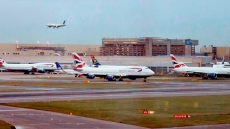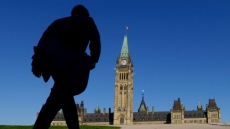VANCOUVER - Another wicked winter storm is set to churn across most of British Columbia, dumping heavy rain on Metro Vancouver, parts of Vancouver Island and the central and inner south coasts, while bringing snow, wind or freezing rain to other regions.
Environment Canada has posted warnings or special weather statements for much of central and southern B.C., while BC Hydro says it is bracing for electrical outages caused by high winds.
Forecasters warn the approaching storm will hit the central coast and northern Vancouver Island first, packing 100 to 150 millimetres of rain, then intensify across the province, carrying snow and rain through Friday.
As much as 90 millimetres of rain is forecast over Howe Sound and Metro Vancouver, along with a chance of wet snow late Thursday, while snow is due to arrive over the central and southern Interior by Thursday evening.
The weather office says north central B.C., from Terrace and Kitimat east to the Alberta boundary, will see 20 to 30 centimetres of snow, while freezing rain could hit the central Interior as the storm pushes northward early Friday.
BC Hydro says it has restored power to most of the roughly 160,000 central and southern Interior customers who lost power in a New Year's Eve snowstorm but several thousand are still in the dark around Kamloops, Vernon, Salmon Arm and Nakusp.
A statement from the utility says it is now preparing for possible damage from high winds linked to the latest storm set to hammer the south coast and Vancouver Island.
Customers in those areas are encouraged to prepare for potential outages, the statement says.
PREPARE FOR AN OUTAGE BEFORE IT HAPPENS
We're also preparing for possible damage from a windstorm that is forecast to hit #VancouverIsland and the south coast today and tomorrow. We're encouraging customers in these areas to prepare for potential power outages: https://t.co/Kyflz96l0E #BCStorm pic.twitter.com/LT7hFGAwk0
— BC Hydro (@bchydro) January 2, 2020
Preparing for an outage starts long before it happens. Here are a few steps you can take now to prepare.
Develop a preparedness plan and share it with your family. Be sure everyone knows what to expect and what to do. Have a contingency plan in case power is out for a longer period.
Make a list of local emergency contact numbers (fire, police, ambulance, etc.). Include 1 800 BCHYDRO (1 800 224 9376) for reporting an outage.
Prepare an emergency kit and store it in an easy-to find location. Check regularly to make sure the kit is well stocked and that all equipment is in good working order.
Use surge protectors to protect sensitive electrical equipment such as computers, DVD players and TVs.
Include a battery operated flashlight in your emergency kit to avoid using candles - they can be a fire hazard.
Use our home outage preparation checklist [PDF, 78 KB] to ensure you and your family are ready for an outage. What should be in an emergency kit?
Prepare for the first 72 hours. Stock your emergency kit with these essentials:
Flashlights
Extra batteries
First aid kit
Bottled water (2 litres per person per day)
Supplies for people with special needs
Copy of your preparedness plan
Battery or crank operated clock and radio
Corded telephone
Non-perishable, ready-to-eat foods
Warm clothing and blankets
Games, cards and books to keep everyone busy
You may need additional supplies for lengthy outages.
Remember to pull out your emergency kit once a year and make sure it still fits the needs of your household. Replace batteries with fresh ones.
During an outage
When your lights go out, check to see whether BC Hydro is already aware of the outage by visiting bchydro.com on a mobile device, calling 1 800 BCHYDRO (1 800 224 9376) or *HYDRO (*49376) on your mobile. If your outage isn’t listed, report it to us when you phone. You can also log in to your BC Hydro account to report an outage online.
Safety first
Never go near or touch a fallen power line. Always assume that a line or anything that it is in contact with is energized. Stay at least ten metres (33 feet, about the length of a bus) away at all times and do not attempt to remove debris surrounding the line.
If you see a fallen power line, report the location by calling 911. Emergency responders will work with our crews to make the area safe and repair the line.



